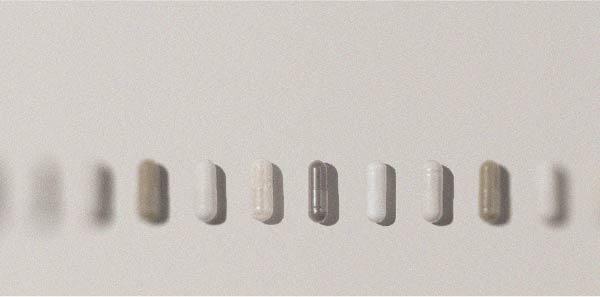When should you take an iron supplement?
According to the World Health Organization (WHO), two billion people across the world suffer from anemia, which means they’re deficient in iron. But when and why should you start taking iron supplements? Here we provide some possible answers.

Causes and symptoms of iron deficiency
In theory, our diet provides all the iron we need to ensure good health. Offal, red meat, poultry, fish and seafood contain varying amounts of iron which are theoretically sufficient to ensure our bodies function properly. Pulses, dried fruit, green vegetables and nuts also contain significant levels of iron though this is absorbed less easily by the body.
In fact, iron from animal sources is absorbed by the body five times more effectively than that from plant sources! It’s also worth noting that vitamin C promotes iron absorption in the body.
However, genetic or circumstantial factors mean that many people are deficient in iron. In developed countries, it is mainly:
- children under 4;
- teenagers;
- women of child-bearing age;
- high-level sportspeople;
- vegans;
- and those suffering from stomach ulcers...
… who are affected by anemia. Some because they are in a period of rapid growth, some due to blood loss from monthly periods (which can significantly affect iron levels in the blood), others because the growth of the placenta and fetus uses up iron, and others still because of the iron needed for intensive exercise.
Iron deficiency can cause a number of symptoms (1-2):
- fatigue;
- paleness;
- palpitations;
- reduced cognitive performance;
- weakened immune function, etc.
Iron supplements: an effective solution
Iron supplements offer a particularly effective response to these symptoms and are widely prescribed by doctors at many stages of life.
A course of iron supplements is thus often recommended for pregnant women and new-born babies. Following several studies suggestive of improved performance among high-level sportspeople, doctors frequently prescribe iron supplementation for such individuals. And finally, iron supplements are often recommended for children and adolescents to improve their intellectual performance.
And there’s a simple reason for this. Provided they’re dosed at a minimum of 2.1mg of iron per 100g (as is the case with our supplement Iron Bisglycinate), iron supplements support (3):
- normal energy metabolism;
- normal intellectual function;
- production of hemoglobin and red blood cells;
- transport of oxygen around the body;
- normal immune system function;
- a reduction in fatigue;
- normal child mental development;
- cell division.
And this is the case even when blood tests show only a moderate level of anemia. Supplementing with iron thus solves many problems and provides numerous benefits.
The danger of too much iron
While a lack of iron, or anemia, is responsible for many diseases and must be addressed with appropriate supplementation, excess iron in the body also poses a risk to health.
Iron actually accumulates in the body and can cause moderate to severe poisoning, depending on the amount absorbed:
- abdominal pain;
- constipation;
- diarrhea;
- nausea;
- vomiting;
- joint pain, etc.
It’s therefore vital that any decision to take iron supplements is not based entirely on symptoms of iron deficiency as these are common to many other deficiencies too!
The decision to supplement with iron must only be taken after a blood test to confirm your iron levels. Obtaining medical advice before starting a course of iron supplements is therefore essential.
If you have trouble concentrating or are suffering from chronic fatigue, you may also want to consider taking a vitamin C supplement (for example Liposomal Vitamin C). In the same vein, you could also try a multivitamin complex (such as Daily 1®), which may contain vitamin C, but also many other nutrients like magnesium and selenium.
References
- https://www.who.int/nutrition/topics/ida/fr/#:~:text=Les%20chiffres%20sont%20impressionnants%3A,aggrav%C3%A9e%20par%20les%20maladies%20infectieuses.
- https://eurekasante.vidal.fr/parapharmacie/complements-alimentaires/fer.html
- EU Register on nutrition and health claims, EFSA, 2014
Keywords
3 Days
Easy to navigate site
Easy to navigate site, had what I was searching for, good price. easy order-check out
James Tucker
9 Days
My skin is clearing up nicely!
Pretty good for my skin so far.
Christian
12 Days
The new packaging is excellent
The new packaging is excellent - finally! No more squashed boxes and torn envelopes.
GORAN
12 Days
Great Product
Great Product
Larry Garrett
17 Days
Quick shipping
Quick shipping; good price. No issues!
Mary McCarty
18 Days
Thr product is very good and is helping…
Thr product is very good and is helping me on my health. Then is always on time
LUGO Luz
21 Days
Buying was fine
Buying was fine. I had problems with the website not recognizing my login info, and had to call to get it fixed. Other than that, everything was good.
David S. Clark
21 Days
Your super maca and super ginseng are…phenomenal
Your super maca and super ginseng are phenomenal supplements that compliment each other when taking them together. Fantastic feeling of well-being and lots of mid day energy without the crash.
Keith Mason
24 Days
I have had amazing results with every…
I have had amazing results with every supplement I've purchased. I am extremely satisfied with this company
kirstin Torres
24 Days
Fine products
Fine products . They are on the leading edge of online supplements. The only issue -so far-is they sometime run out of subscription items.
Jason Argos
27 Days
The ordering process is very user…
The ordering process is very user friendly and the products always come in a timely manner.
CARTER Rhonda
28 Days
The price for Dr
The price for Dr. Pero's AC-11 is reasonable and in line with his views. (my former colleague). Keep it pure.
CAMPBELL Clayton
30 Days
Right on every time.
Right on every time.
Arthur Nicholas
33 Days
They are cheaper than everyone else and…
They are cheaper than everyone else and the shipping was fast. Great company.
Patricia Adams
40 Days
Availability of quality health…
Availability of quality health supplements and it's wide variety is impressive. Ordering is seamless and shipping even during the holidays is well streamlined.
Mohamad Hussein




